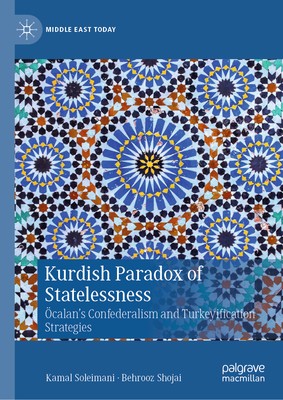
- Išsiųsime per 10–14 d.d.
- Autorius: Kamal Soleimani
- Leidėjas Palgrave Macmillan
- ISBN-10 : 3031837452
- ISBN-13 : 9783031837456
- Formatas: 14.8 x 21 x 1.6 cm, kieti viršeliai
- Kalba: Anglų
- Extra -15 % nuolaida šiai knygai su kodu: ENG15
Atsiliepimai
Aprašymas
This book critically examines Abdullah ÃÂcalan's proposal of "democratic confederalism," introduced in 2005, and its theoretical and practical implications. Despite its claims to transcend the nation-state model, ÃÂcalan's project leaves the colonial structures of the Turkish, Persian, and Arab states unchallenged, legitimizing their assimilatory and genocidal tendencies. It fails to secure Kurdish self-determination or protect linguistic and cultural rights, including mother-tongue education. The study interrogates these contradictions, offering a comprehensive critique of ÃÂcalan's ideology and its limited impact on governance, Kurdish identity, and aspirations for autonomy.
Drawing on ÃÂcalan's original Turkish writings, the book challenges prevailing scholarship that often relies on selective translations and sympathetic interpretations. It reveals the foundational limitations of ÃÂcalan's approach, exposing the structural barriers it sustains and its complicity in perpetuating Turkification tendencies under the guise of Kurdish politics.
EXTRA 15 % nuolaida
Kupono kodas: ENG15
Akcija baigiasi už 17:45:18
Nuolaidos kodas galioja perkant nuo 10 €. Nuolaidos nesumuojamos.

- Autorius: Kamal Soleimani
- Leidėjas Palgrave Macmillan
- ISBN-10: 3031837452
- ISBN-13: 9783031837456
- Formatas 14.8 x 21 x 1.6 cm, kieti viršeliai
- Kalba: Anglų
This book critically examines Abdullah ÃÂcalan's proposal of "democratic confederalism," introduced in 2005, and its theoretical and practical implications. Despite its claims to transcend the nation-state model, ÃÂcalan's project leaves the colonial structures of the Turkish, Persian, and Arab states unchallenged, legitimizing their assimilatory and genocidal tendencies. It fails to secure Kurdish self-determination or protect linguistic and cultural rights, including mother-tongue education. The study interrogates these contradictions, offering a comprehensive critique of ÃÂcalan's ideology and its limited impact on governance, Kurdish identity, and aspirations for autonomy.
Drawing on ÃÂcalan's original Turkish writings, the book challenges prevailing scholarship that often relies on selective translations and sympathetic interpretations. It reveals the foundational limitations of ÃÂcalan's approach, exposing the structural barriers it sustains and its complicity in perpetuating Turkification tendencies under the guise of Kurdish politics.


Atsiliepimai